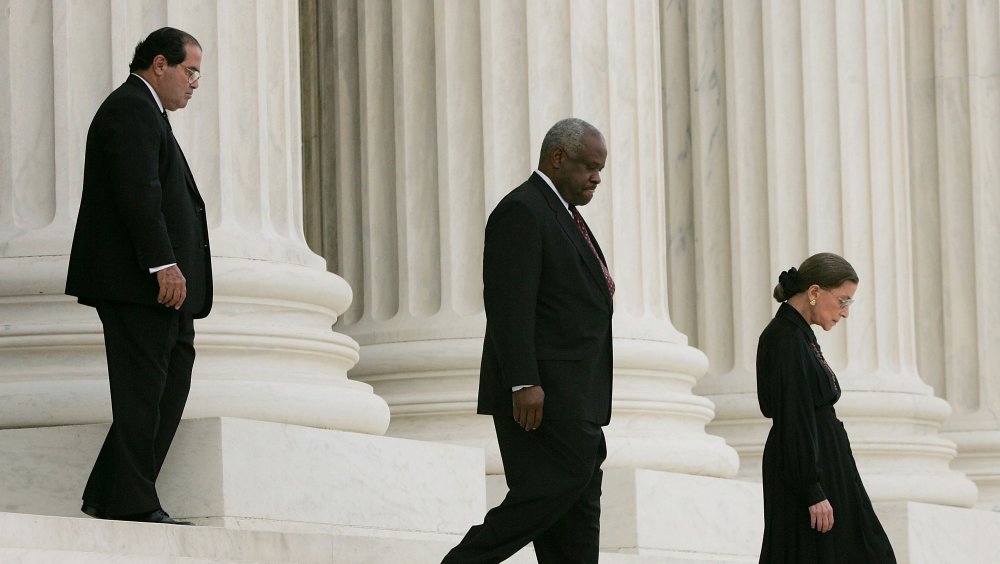RBG Dissent in Garamendi A Major Beacon to SCOTUS

On October 29, 2020, the Holocaust Survivors Foundation USA (HSF), and several of its individual leaders filed an amicus curiae brief in the United States Supreme Court in support of Holocaust survivors and victims’ heirs in two consolidated cases set for oral argument on December 7, 2020: Republic of Hungary v. Rosalie Simon, and Federal Republic of Germany v. Alan Philipp. Simon is a class action by Hungarian survivors against the Hungarian National Railway for compensation for the Railway’s theft of the victims’ property during Hungary’s deportation of Hungarian Jewry to Auschwitz beginning in 1944. Philipp is a claim by the heirs of German Jewish art collectors who the Nazis forced to sell a valuable art collection for minimal value in 1935.
The HSF amicus brief supports and applauds the decision of the District of Columbia Court of Appeals, which held that Germany’s and Hungary’s theft of Jewish citizens’ property in perpetrating the Holocaust constituted genocide and therefore was a “taking of rights in property in violation of international law,” establishing federal court jurisdiction for the plaintiffs’ restitution claims under the Foreign Sovereign Immunities Act (FSIA). Further, HSF agrees with the D.C. Circuit’s decision that once FSIA jurisdiction is satisfied, the foreign governments or instrumentalities are not entitled to use amorphous “foreign policy” arguments to displace jurisdictional criteria established by Congress and applied by the Courts, which is what Germany, Hungary, and the U.S. Government are urging the Supreme Court to allow.
HSF is making this important effort to support the Simon and Philipp plaintiffs because, sadly, U.S. courts at all levels have often invoked “foreign policy” to deny Holocaust survivors and heirs of Holocaust victims the rights, protections, and benefits of existing and well-established judicial principles and doctrines. The results have been catastrophic for Holocaust victims, allowing governmental and corporate Holocaust profiteers to avoid accountability, and denying survivors and victims’ families the opportunity to obtain material and moral restitution available under the law.
The HSF’s amicus brief focuses on the Supreme Court’s 2003 decision in American Insurance Association, Inc. v. Garamendi, 539 U.S. 396 (2003). In Garamendi, the Court held that a California statute requiring insurers doing business there to publish information about unpaid Holocaust era insurance policies was preempted by the executive branch’s “foreign policy,” despite the lack of any treaty, statute, or preemptive executive agreement. The Court relied on letters and congressional testimony of lower level executive branch officials, and an expressly non-preemptive executive agreement, to strike down the California statute.
Justice Ruth Bader Ginsburg wrote a blistering dissent in Garamendi, and brilliantly deconstructed the majority’s reasoning. Among other points, Justice Ginsburg showed that it was unprecedented and contrary to established constitutional jurisprudence to hold that a state law like California’s could be “preempted” by amorphous “foreign policy” unconnected to an act of federal lawmaking, such as a Treaty signed by the President and ratified by the Senate, or a statute passed by both Houses of Congress and signed by the President. Justice Ginsburg wrote:
We have never premised foreign affairs preemption on statements of that order . . . We should not do so here lest we place the considerable power of the foreign affairs preemption in the hands of individual sub-Cabinet members of the Executive Branch. . . ‘[N]o authoritative text accords such officials the power to invalidate state law simply by conveying the Executive’s views on matters of federal policy. The displacement of state law by preemption properly requires a considerably more formal and binding federal instrument.
539 U.S. at 442 (emphasis supplied). She added: “As I see it, courts step out of their proper role when they rely on no legislative or even executive text, but only an inference and implication, to preempt state laws on foreign affairs grounds.” Justice Ginsburg’s dissent was joined by Justices Scalia, Thomas, and Stevens.
With Justice Ginsburg’s passing, the Holocaust survivor leadership believes it is important to reprise her important analysis now to prevent Holocaust collaborators and profiteers to resort to standardless and shifting “foreign policy” considerations to supersede established legal principles, which the DC Circuit correctly applied:
The concerns raised by Justice Ginsburg’s dissent in Garamendi sound a clear warning for the Simon and Philipp cases. Germany and Hungary ask the Court to abandon the long-established principles of statutory construction applied by the Court of Appeals below, and allow standardless Executive branch “foreign policy” to dictate the rights of Holocaust survivors and heirs of Holocaust victims. In Garamendi, this approach inflicted pain, insult, and financial injury to Holocaust survivors and their families, and handed a multi-billion dollar windfall to global insurers such as Allianz, Generali, AXA, and others, who collaborated with the Nazis and profited from the Holocaust.
The organization’s amicus brief was filed by HSF’s long-time counsel Samuel J. Dubbin, of the law firm of Dubbin & Kravetz, LLP, in Miami, Florida.
